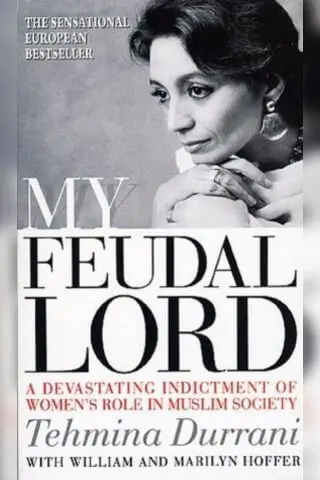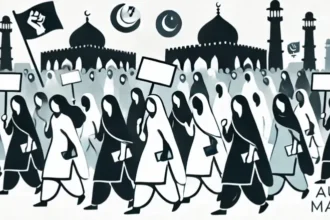Tehmina Durrani is a well-known Pakistani feminist author, artist, and, most importantly, women’s and children’s rights activist. She mostly writes about the intense issues and challenges faced by women in a deeply patriarchal society, inviting her readers to reflect more deeply. She has written some other insightful books such as “Blasphemy” and “Happy Things in Sorrow Time,” having thematic concerns on religious exploitation, suppression, marginalization, and subjugation of women in patriarchal Muslim society. Most significantly, being from an elite class, she criticizes the oppression of feudal culture through her heart-piercing story.
In her bestselling book “My Feudal Lord” (A Devastating Indictment of Women’s Role In Muslim Society), she vibrantly highlights the issues of her own life when she married Ghulam Mustafa Khar, a well-known Pakistani politician, former governor of Punjab, and right-hand man of Zulfiqar Ali Bhutto. Before her second marriage to Mustafa Khar, she was first married to Anees, who was a nice and gentle man.
She began experiencing nightmares after leaving Anees and marrying Khar. She felt like she was living a hell because she had made many sacrifices to save her relationship, only to be repeatedly frustrated by Mustafa’s cynical attitude. Despite this, she chose to stay with him because their family was forced into exile during the Zia ul Haq years.
On the very first page of the book, Khar is portrayed in the worst possible way as a womanizer, an archetypal male chauvinist who forces a woman to love him despite his excruciating treatment, extremely cruel, and a political opportunist. She even accuses her husband and younger sister of having an illicit relationship. However, the author herself does not come out smelling of roses. Her own actions, motives, and choices seem highly questionable as she spends a long time with this man despite all his alleged cruelty and exploitation. She uses real-life characters and real political events to tell the story. She eventually leaves him because the treatment of Mustafa left no iota of self-esteem in her and decides to write this memoir.
Additionally, politics also serves as a major theme of the book. As Mustafa seems a fervent and imminent political figure and gets the title “Lion Of Punjab” by his followers. He was a staunch supporter of Zulfikar Ali Bhutto. However, he believed that the Pakistan Army has been the major cause of our problems and examined that an attempt of coexistence with the military was Bhutto’s biggest mistake because it was the Army who toppled him and General Zia who ordered his execution. Tehmina also accentuates that he had to some extent outspoken and human-centric approach caring for poor people, criticizing the bad policies of General Zia by saying that Americans are untrustworthy allies supporting Zia for their benefits. Sadly, she herself admits in the book that she was Mustafa’s political shadow.
The biggest irony of all, after she left Khar, Tehmina Durrani married Nawaz Sharif’s brother, Shahbaz Sharif! He too was the Chief Minister of Punjab, like Khar. It seems she could not settle for lesser mortals; her husbands must have been political heavyweights. She had little remorse for leaving her first husband to marry Khar.
Finally, throughout this novel, the author makes an exemplary attempt to present the suffering of a woman trapped in this semi-patriarchal society, be it poor or rich. Women have always had to suffer frustration, disillusionment, mental and physical pain due to social restrictions in a deep-seated feudal society. Every woman has to suffer in this society until she gets her milk out. If you too have suffered from this biased patriarchal culture, this book is worth reading and understandable.








